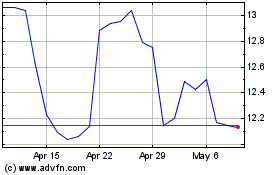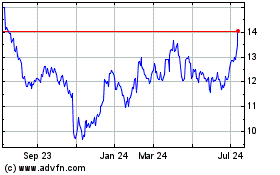By Mike Colias and Christina Rogers
Nearly three years into his tenure, Ford Motor Co. Chief
Executive Jim Hackett's fix-it list is longer than when he took
over, including assuaging employees upset by the recent departure
of a veteran company executive.
When Mr. Hackett became CEO in May 2017, Ford was posting
near-record operating profit but also contending with a beaten-down
share price and rising investor skepticism about its growth
prospects. Since that time, the Dearborn, Mich., auto maker's stock
has tumbled 27%, erasing about $12 billion from the company's
value.
While Mr. Hackett has tried to steer Ford deeper into potential
growth areas, he has struggled with the nuts-and-bolts of making
and shipping cars, analysts say. Ford's business in China is no
longer generating steady profits, and in the U.S. vehicle-rollout
problems and high warranty costs have taken a toll, with the
company's operating profit falling for three straight years.
Last week, Ford reported disappointing fourth-quarter earnings
and a lackluster 2020 outlook, leading to the stock's biggest
single-day decline in nine years. Also, the auto maker shuffled its
executive team, appointing strategy head Jim Farley as chief
operating officer, a position just below Mr. Hackett, and
announcing the departure of automotive president Joe Hinrichs.
The shake-up left many employees frustrated and perplexed by the
sudden departure of Mr. Hinrichs, a manufacturing specialist who
had been with Ford for nearly two decades, according to people
close to and within the company.
Shortly after his exit was announced, the company's internal
website was flooded with comments expressing disappointment about
the move and in some cases questioning Ford's direction under Mr.
Hackett, according to selected postings shared with The Wall Street
Journal. Some employee comments were supportive of Mr. Farley's
promotion.
In a call with reporters Friday, Mr. Hackett lauded Mr.
Hinrichs's career at Ford and described him as "beloved."
"But everybody believes the momentum we're talking about
building here is the right thing to do," the 64-year-old CEO
said.
Mr. Hackett has said repeatedly that he isn't satisfied with the
company's performance, telling analysts last week that the 2019
results fell short of expectations. Management's "execution was
simply not nearly good enough," he said.
In broadening Mr. Farley's role, Mr. Hackett said, the company
will be better equipped to meet the immediate challenge of making
and selling cars, while also strategizing for a disruptive future
of electric, driverless and connected vehicles.
"This is something that I started to work on more than a year
ago...to see how a company like Ford can straddle these two eras,"
Mr. Hackett said of the executive changes.
Mr. Farley, 57, began his career at Toyota Motor Corp., where he
oversaw the Lexus luxury brand. After joining Ford in 2007, he was
marketing chief for several years and also ran the European
business. Last spring he was made head of strategy and technology,
charged with plotting Ford's strategy on electric cars and other
long-term bets.
Mr. Hinrichs had been promoted in April to president of
automotive, overseeing Ford's auto-making operations globally,
including vehicle development and manufacturing. That role situated
him as a co-No. 2 with Mr. Farley in what many viewed as a
competition for the top job.
Ford said the 53-year-old Mr. Hinrichs is retiring, effective
March 1. But people with knowledge of the situation said his
company email was shut down by the end of last week after he was
asked to leave in the wake of Ford's disappointing earnings report
on Tuesday.
A Ford spokesman and Mr. Hinrichs declined to comment.
In a letter to employees, Mr. Hinrichs ticked off many
accomplishments, including successfully lobbying for the
reintroduction of the once-popular Bronco sport-utility vehicle and
mapping out a turnaround plan for Ford's China business.
"There were stumbles, but there were many more successes," he
wrote.
Before leading Ford, Mr. Hackett was CEO of Michigan-based
furniture maker Steelcase Inc. When recruiting him in 2017,
Executive Chairman Bill Ford described Mr. Hackett as an outside
visionary who could plot Ford's future at the time when electric
vehicles, in-car connectivity and the growth of ride-hailing
providers like Uber Technologies Inc. are reshaping the
business.
In mid-2018, Mr. Hackett outlined an $11 billion, multiyear
restructuring that led to the closure of factories and thousands of
layoffs, mostly in Europe and Latin America. He said the effort has
eliminated layers of management to allow the company to move
faster. He also has focused on more-profitable vehicles, adding to
Ford's truck and SUV lineup and betting bigger on commercial
vehicles while eliminating nearly all passenger cars.
But those moves have yet to translate into earnings growth.
Ford said the delayed rollout of a redesigned Explorer SUV --
the first major revision of the popular model in nearly a decade --
weighed on profit in the third and fourth quarters. It also blamed
higher warranty costs, a problem expected to linger in 2020.
The company is gearing up for a busy and costly launch year
ahead, including the introduction of a redesigned F-150 pickup
truck, its biggest profit generator. And Deutsche Bank analyst
Emmanuel Rosner said there is now increased risk without Mr.
Hinrichs, who served in many manufacturing roles at Ford and had
direct oversight of vehicle launches.
Mr. Hackett said the company has a "deep bench" of manufacturing
expertise. "I'm really confident that we won't miss a beat."
Analysts have criticized Mr. Hackett for the slow pace of the
turnaround and a lack of specifics on its progress and
prospects.
Ford has missed Wall Street's earnings forecasts five of the 10
full quarters that Mr. Hackett has overseen, according to FactSet.
Rival General Motors Co. has fallen short of analysts' expectations
just twice in the 23 quarters that Mary Barra has led the auto
maker.
Ed Wachenheim, chairman of Greenhaven Associates, one of Ford's
largest shareholders, said he views the company's warranty and
rollout issues as likely short-term, while continued strength in
pickup trucks and the success of Mr. Hackett's efforts to stanch
losses overseas should eventually pay off.
"Temporary problems do not change the long-view value of a
company," Mr. Wachenheim said in an interview.
--Ben Foldy contributed to this article.
(END) Dow Jones Newswires
February 11, 2020 14:08 ET (19:08 GMT)
Copyright (c) 2020 Dow Jones & Company, Inc.
Ford Motor (NYSE:F)
Historical Stock Chart
From Mar 2024 to Apr 2024

Ford Motor (NYSE:F)
Historical Stock Chart
From Apr 2023 to Apr 2024
